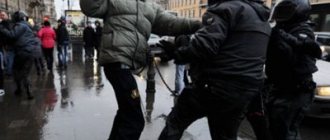Liability for passive disobedience is different from liability for insulting or resisting police officers.
We will tell you more about responsibility for disobedience. We will also touch on its differences from resistance and insulting a police officer.
If you require specific assistance in resolving disagreements that have arisen as a result of disobeying a government official, you can involve an appropriate specialist in the matter.
Do you want to figure it out, but don’t have time to read the article? Lawyers will help
Entrust the task to professionals. Lawyers will complete the order at the cost you specify
214 lawyers on RTIGER.com can help with this issue
Solve the issue >
Powers of police officers
So that police officers can fulfill their duties in maintaining law and order, the law has vested them with the powers specified in Art. 13 of Law No. 3 “On the Police”. A police officer on duty has the right to:
- demand from individuals or legal entities to stop illegal actions that create obstacles to the normal work of government bodies;
- check identity documents if there are grounds to suspect a citizen of committing a crime;
- summon citizens to the police station, interrogate them, take explanations, forcefully bring in officials or citizens who evade appearance;
- in cases under investigation, request information regarding citizens from medical and other organizations;
- visit any organizations, public associations, get acquainted with documents and take all necessary actions to verify citizens’ complaints and conduct preliminary inquiries into initiated cases;
- carry out patrol service, equip checkpoints, barriers and take other measures to organize public safety;
- draw up protocols and collect evidence in administrative cases;
- carry out operational search activities, seize documents, evidence, other materials, put on the wanted list persons suspected of committing crimes or missing persons;
- forcibly bring to the department persons whose identity has not been established or who are under the influence of alcohol or drugs, and send them for a medical examination;
- inspect citizens and their belongings, vehicles, if they are suspected of storing and transporting explosives, weapons, and other prohibited items.
In ch. 5 of the Law “On Police” stipulates situations in which officers have the right to use special protective equipment, including weapons. The use of force is justified when a peaceful solution is impossible, the citizen actively resists, and his actions pose a threat to others.
Note!
The use of force is unacceptable against pregnant women, children, disabled people, and the elderly.
How should documents be verified?
Disobedience to a police officer is punishable by law. But police officers must act strictly according to the Charter. Citizens of the Russian Federation are not required to carry an identity card with them at all times. Therefore, such a demand from a police officer would be illegal. This means that the citizen does not bear any responsibility.
The most common case of detention is a document check. In this case, the police officer must be in uniform. Have a service ID and a route or post card, which indicates the patrol location and the exact time of duty. When stopping a citizen, the policeman must introduce himself, say hello, state his position, full name and reason for checking documents. And at the request of the citizen, present him with his official ID, explain the reasons for checking the documents:
- the citizen looks like an identikit of a wanted offender;
- the person has escaped or is hiding from punishment;
- the citizen evades compulsory medical measures or visiting a specialized medical institution;
- a person tries to enter a protected area;
- when a citizen attempts suicide or has a pronounced mental disorder;
- search for persons who escaped from a psychiatric hospital;
- there is a requirement to extradite a foreign citizen in the manner prescribed by the current legislation of the Russian Federation.
Disobedience and resistance - what's the difference?
Resistance and disobedience are two forms of non-compliance with the demands of a police officer, the line between which is thin. Disobedience is passive in nature and can be expressed in refusal or ignoring to present documents at the request of a police officer who is on duty.
Thus, disobedience can be through:
- open calls not to comply with police demands;
- group or solo;
- dissemination of information that could lead to mass unrest.
Resistance is expressed in active opposition to police officers in order to prevent them from performing their duties. This poses a danger to the life and health of police officers, and also undermines their authority.
Both acts are a consequence of the desire to avoid responsibility for an offense or carrying prohibited items or substances.
Armed resistance to police
The use of weapons as such does not serve as an aggravating circumstance in court proceedings. In such cases, the decisive factor is the degree of harm caused to the police officer and the presence of a threat to life.
However, if a citizen who resisted arrest by police officers is found to have a weapon, additional liability arises, determined by the Criminal Code.
For example, if there is no official permit for a weapon, this will aggravate the guilt of the detained citizen.
You cannot carry a weapon while intoxicated or draw it unless there is a direct threat to life.
In addition, it is prohibited to bring weapons to public events (rallies, concerts, religious meetings).
So a citizen who is detained with a weapon and resists can be prosecuted on at least two counts - illegal possession and carrying of weapons and hooliganism.
Article of the Criminal Code of the Russian Federation
As such, there is no article for resisting police officers in the Criminal Code of the Russian Federation, therefore each case is considered separately and can be qualified under several articles.
If during the arrest a citizen insulted police officers or used obscene language, then he will be charged under Art. 319 of the Criminal Code of the Russian Federation “Insulting a representative of authority.” The punishment for such an act is a fine of 40,000 rubles, compulsory or correctional labor.
In case of gross violation of order, the detainees may be convicted under Part 2 of Art. 213 of the Criminal Code of the Russian Federation “Hooliganism”. The maximum punishment ranges from a fine of 1 million rubles to forced labor and imprisonment for up to 7 years.
An attack on police officers during the performance of their duties that threatens their lives is punishable under Art. 317 of the Criminal Code of the Russian Federation, while the court can impose a sentence of 12 to 20 years, and in special cases - life imprisonment.
In the case where the attackers only made threats or the action did not pose a danger to the life of the policeman, the act is qualified under Part 1 of Art. 318 of the Criminal Code of the Russian Federation “Use of violence against a representative of the authorities.” If there was a threat to the lives of police officers, Part 2 318 of the Criminal Code of the Russian Federation is applied. The punishment is imprisonment.
Illegal demands
For disobedience to a police officer (Administrative Code Article 19.3, part 1) punishment is due. But law enforcement officials do not always act in accordance with their powers. And that is why Article 19.3, Part 1 causes the most controversy. Police sometimes demand documents for verification without any reason.
And if a citizen begins to ask why a passport is required, then the police, instead of answering, take him to the department. And there a protocol of disobedience is already drawn up.
For disobedience to a law enforcement officer, a citizen may be fined or subject to other administrative penalties. And the situation here is twofold. A citizen will not be able to prove that he spoke politely with government officials. And the police can always claim that they acted legally. For example, that a citizen refused to go to the department or looks like a wanted criminal. And when it comes to court, he mostly sides with the police.
Criminal liability
In case of resistance to police officers, Art. 318 of the Criminal Code of the Russian Federation “Use of violence against a representative of the authorities.” Liability depends on the severity of the act. If no harm is caused, the courts impose punishment in the form of a fine, forced labor for up to 5 years, arrest or imprisonment for up to 5 years.
Note!
In cases where police officers were physically injured during resistance, the attacker could receive a prison sentence of up to 10 years.
What is the procedure for arrest?
The procedure for this is given in the Police Act and consists of several stages. Strict adherence to the sequence of stages and execution of the necessary documents is proof of the legality of the detention.
Need to know
To avoid additional charges of resisting police officers upon arrest, you should refrain from harsh statements and actions. At the same time, the citizen has every right to note in the protocol his opinion about the current situation. He can add the necessary notes to the document or simply refuse to sign it.
- The employee is obliged, first of all, to introduce himself, voice the purpose and reason for the appeal, and present identification if the citizen asks to do so.
- The detainee is required to explain his rights: to the assistance of a lawyer, to an interpreter if necessary, to notify his relatives, to refuse to give explanations.
- Within three hours from the moment of arrest, a citizen has the right to inform his loved ones by telephone about his location, or this can be done by a police officer at his request.
- A protocol must be drawn up, a copy of which is given to the detainee, and information about the detention is entered into the register. The protocol contains information about the detainee and the officer who carried out the detention, and the grounds for the detention. The protocol is signed by the detainee and the officer who compiled it.
This information will help to influence police officers who violate the detention procedure within the framework of the law without resisting. If a citizen resists arrest, he may be subject to administrative or criminal liability, depending on the circumstances under which this occurred.
Fine for disobedience
For disobedience, criminal but also administrative liability is provided. For failure to comply with the requirements of a person on duty, or for obstructing him in fulfilling his duties to protect law and order, he may be held accountable under Art. 19.3 Code of Administrative Offenses of the Russian Federation.
To prove illegal actions, it is enough for police to draw up a report on an administrative offense. As a result, the citizen will have to pay a fine to the state in the amount of 500 to 1,500 rubles.
What to do if a police officer acts illegally
In the event of unlawful demands from the police, you may refuse to comply with them if such actions are clearly violent.
Be sure to tell the police that you believe their actions were unlawful. Require formalities.
But when it is difficult to distinguish a legal requirement from an illegal one, it is better to obey the police.
You will still have to prove your position in court that the police acted unlawfully. And our courts are usually on the side of the police.
But if they are trying to illegally arrest you, it is better not to offer physical resistance. Even if you manage to prove that the arrest was illegal, you may still be prosecuted.
What is the classification of this crime?
The arrest is carried out by the police in accordance with the law. Eliminates harm to the employee and resistance. The suspect, even if he denies his guilt, must behave correctly and not accept violence.
The influence of the authorized person can be expressed in:
- refusal to demand to stop criminal acts;
- refusing an order to put your hands behind your back;
- disobeying an order;
- refusal to put the weapon on the ground, lower the pistol;
- disobeying a police officer using force;
- attempting to use a weapon or physical force against a police officer.
A violation may include swearing at authorized officials or in other actions that interfere with the arrest. The act is qualified as resistance to law enforcement officials.







